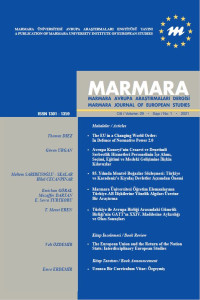AVRUPA KONSEYİ’NİN CEZAEVİ VE DENETİMLİ SERBESTLİK HİZMETLERİ PERSONELİNİN İŞE ALIMI, SEÇİMİ, EĞİTİMİ VE MESLEKİ GELİŞİMİNE İLİŞKİN KILAVUZLAR
Öz
Kamusal nitelikte bir faaliyet olarak nitelendirilmekte olan infaz hizmetleri genel olarak adalet ve güvenlik hizmetlerinin bir bileşiminden oluşmaktadır. Cezaevlerinde bulunan hükümlülerin güvenliklerinin sağlanması ile eğitim ve iyileştirmelerinden sorumlu olan cezaevi çalışanlarının mesleklerinin gerektirdiği seviyede hizmet sunabilmeleri amacıyla nitelikli bir şekilde istihdam edilmeleri, kendilerinde aranan yetkinliklere sahip olabilmeleri amacıyla yüksek nitelikte ve düzenli eğitimler almaları ve mesleki gelişimlerinin kurumlarınca desteklenmesi gerekmektedir. Uluslararası düzlemde tavsiye niteliğinde diğer öncül belgeler mevcut olsa da 25 Nisan 2019 tarihinde Avrupa Konseyi Suç Sorunları Komitesi’nce kabul edilen Kılavuzlar, belirtilen konulara ilişkin olarak Konseye üye devletlerin bilgi ihtiyaçlarını karşılamak ve onlara yol göstericilik sağlamak üzere hazırlanan ayrıntılı ve güncel bir tavsiye belgesi niteliğindedir. Kılavuzlar; tanımlar, temel ilkeler, personelin işe giriş için eğitim seviyeleri, işe alım ve seçim kriterleri, boş pozisyonların ilanı, giriş değerlendirme süreçleri, eğitim ve öğretim, hizmet içi eğitim ve öğretim, başlangıç eğitiminin ve ilk istihdamın doğrulanması, eğitim ve öğretimin kalitesi / uzun vadeli etkinlik, mesleki gelişim ve meslek etiğine ilişkin toplam on iki maddeyi ve personel eğitimine ilişkin konuları gösteren iki ek matrisi içermektedir. Kılavuzlar’ın, cezaevi ve denetimli serbestlik personelinin istihdamı, eğitimi ve mesleki gelişimi konularına ilişkin olarak doğrudan doğruya özgün ve yenilikçi bir yaklaşım getirmekten ziyade, bu süreçlerin her birinin farklı boyutlarını ve birbirleriyle bağlantılarını ortaya koyan detaylı ve bütüncül yaklaşımıyla infaz hizmetleri personelinin profesyonel yetkinliklerinin gelişimi sürecinde Avrupa Konseyi üyesi devletlere yol gösterici olacağı değerlendirilmektedir.
Anahtar Kelimeler
Cezaevi personeli denetimli serbestlik personeli infaz hizmetleri personeli Avrupa Konseyi infaz hizmetleri personel eğitimi personel istihdamı mesleki gelişim meslek etiği
Kaynakça
- Carr, N. (2020) “Recruitment, training and professional development of probation staff”, Academic Insights 2020/02, HM Inspectorate of Probation, <https://www.justiceinspectorates.gov.uk/hmiprobation/wp-content/uploads/ sites/5/2020/02/Academic-Insights-Carr-Final.pdf>, (18 Ocak 2021).
- Ceza ve Tevkifevleri Genel Müdürlüğü (2017) “Ceza İnfaz Kurumlarının Yönetim, Dış Koruma, Hükümlü ve Tutukluların Sevk ve Nakilleri ile Sağlık Hizmetlerinin Yürütülmesi Hakkında Protokol”, 26 Ocak 2017, <http://cte.adalet.gov.tr/Resimler/Dokuman/592019112913p47.pdf>, (5 Şubat 2021).
- Ceza ve Tevkifevleri Genel Müdürlüğü (2021) “Ceza ve Tevkifevleri Genel Müdürlüğü Kadro Durumu”, 1 Nisan 2021, <http://cte.adalet.gov.tr/Home /SayfaDetay/personel-durumu>, (5 Nisan 2021).
GUIDELINES OF THE COUNCIL OF EUROPE REGARDING RECRUITMENT, SELECTION, EDUCATION, TRAINING AND PROFESSIONAL DEVELOPMENT OF PRISON AND PROBATION STAFF
Öz
Being defined as a public service, enforcement services include a combination of justice and security services in general. To ensure service at the level required from their occupation, the prison staff, who are responsible for providing security for the prisoners and also for their education and rehabilitation, should be recruited in a qualified form, have regular and high-quality training fit for their expected competencies and be supported by their institutions through their professional development. Even if there exist other advisory documents at the international level, the “Guidelines” adopted by the European Committee on Crime Problems (CDPC) on 25th April 2019 is a detailed and updated advisory document developed for meeting information requirements of the Member States of the Council of Europe on the stated subjects and providing guidance for them. It includes twelve articles related to definitions, key principles, entry educational levels of staff, criteria regarding recruitment and selection, advertising of vacant posts, entry assessment procedures, education and training, in-service education and training, validation of induction training and initial employment, quality of education and training / long-term effectiveness, professional development, professional ethics and two additional matrixes revealing subjects about staff training. Rather than bringing directly a genuine and innovative approach on the subjects about recruitment, selection, education, training, and professional development of prison and probation staff, the Guidelines, with their embracing and comprehensive approach, putting forward different dimensions of each of them and their connections with each other, are assessed as the ones instructing the Member States of the Council of Europe in the process of increasing professional competencies of corrections staff.
Anahtar Kelimeler
Prison staff Probation staff Corrections staff Council of Europe Enforcement services Staff training Staff recruitment Professional development Professional ethics.
Kaynakça
- Carr, N. (2020) “Recruitment, training and professional development of probation staff”, Academic Insights 2020/02, HM Inspectorate of Probation, <https://www.justiceinspectorates.gov.uk/hmiprobation/wp-content/uploads/ sites/5/2020/02/Academic-Insights-Carr-Final.pdf>, (18 Ocak 2021).
- Ceza ve Tevkifevleri Genel Müdürlüğü (2017) “Ceza İnfaz Kurumlarının Yönetim, Dış Koruma, Hükümlü ve Tutukluların Sevk ve Nakilleri ile Sağlık Hizmetlerinin Yürütülmesi Hakkında Protokol”, 26 Ocak 2017, <http://cte.adalet.gov.tr/Resimler/Dokuman/592019112913p47.pdf>, (5 Şubat 2021).
- Ceza ve Tevkifevleri Genel Müdürlüğü (2021) “Ceza ve Tevkifevleri Genel Müdürlüğü Kadro Durumu”, 1 Nisan 2021, <http://cte.adalet.gov.tr/Home /SayfaDetay/personel-durumu>, (5 Nisan 2021).
Ayrıntılar
| Birincil Dil | Türkçe |
|---|---|
| Bölüm | Makaleler |
| Yazarlar | |
| Yayımlanma Tarihi | 30 Haziran 2021 |
| Yayımlandığı Sayı | Yıl 2021 Cilt: 29 Sayı: 1 |

